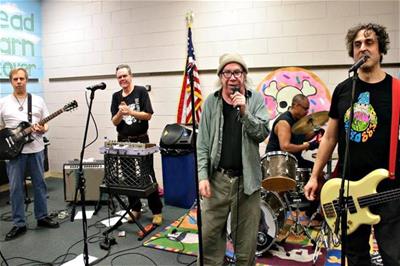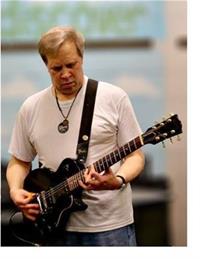Personalized Stroke Rehabilitation Gets
Punk-Rocker Paul Back Into the Groove of His Life

In the spring of 2015, west-suburban resident Paul C. fell sick with flu-like symptoms. Three weeks went by, and he noticed it was becoming more difficult to breathe while lying in bed. He went to his primary care physician and was diagnosed with a severe lung infection. During a six-hour surgery, doctors deflated, cleaned out and reinflated his right lung, removing several liters of fluid in the process. He wasn’t in the clear yet; while still recovering that summer, he faced another health crisis. This one brought him to Swedish Hospital, a move that he remains eternally grateful for.
Following his lung surgery, Paul spent several weeks in a transitional care facility on the city’s north side. He was prescribed antibiotics and worked to regain his strength. With only two weeks of antibiotic treatment left before he his discharge date, Paul woke one night in a very confused state—the result of a stroke.
He was transferred to Swedish Hospital, where he spent a week in acute care before transitioning to the inpatient rehabilitation unit. The stroke had caused Paul to lose the use of the right side of his body. He had to relearn how to walk, talk and perform daily activities.
Among the main concerns that his therapists addressed was that Paul had developed expressive aphasia—a condition that prohibited him for finding or saying the words he was thinking. He worked with Kelley Foley and Deanna Foxworthy, speech-language pathologists at Swedish Hospital. His initial evaluation displayed that he could not put words together consistently or most of what he said was not the words he intended. At the start, he was not even able to write his name and read at a functional reading level.
“There were some multi-syllabic words that I could say with no problem, and then basic words that completely stumped me,” he said. “Kelley and Deanna had good strategies for dealing with everything. They would have me sing—rather than try to speak—a sentence, and I could do it.” He demonstrated the method by singing a sentence to the tune of “Twinkle, Twinkle, Little Star.”
Paul slowly gained back his faculties through the combined efforts of the therapy team and himself. Over this period, he made remarkable progress.
 “We used a variety of techniques and methods with Paul,” said Kelley. “He was up for every challenged and worked exceptionally hard. He was so motivated and committed to his recovery, displaying a positive attitude the entire time and encouraging other patients to do their best. He worked hard outside of the speech therapy room as well. By the time he left, he was speaking more fluently, using a more complex vocabulary and still improving.“
“We used a variety of techniques and methods with Paul,” said Kelley. “He was up for every challenged and worked exceptionally hard. He was so motivated and committed to his recovery, displaying a positive attitude the entire time and encouraging other patients to do their best. He worked hard outside of the speech therapy room as well. By the time he left, he was speaking more fluently, using a more complex vocabulary and still improving.“
The therapeutic process was intensive, with Paul spending three to four hours in a customized care plan consisting of physical, occupational and speech therapy. “All of the therapists are very committed and genuinely proud of me when I did well,” he said. “They will be a part of my life forever. I cannot speak highly enough of the entire staff. They were unbelievably wonderful.”
When Paul visited the team after discharge, they were enthusiastic about the incredible progress he had made. “It’s so exciting to work with people like Paul and see all their fantastic accomplishments,” said Kelley. “It was a joy to have him come walking back into the rehabilitation unit without a device and being able to carry on a conversation.”
Paul’s greatest accomplishment came the moment that he was able to return to his passion, which was something he thought impossible after the stroke. “My right arm was just hanging after my stroke, he said. “Now I can write and I can play the guitar again. I had been extremely worried about that.”
He has been in the music business for more than 30 years, both as a sound engineer and as a musician. Through continuing his healing in outpatient therapy, he is still able to play guitar in what he is proud to say is “one of the oldest punk rock bands”: Silver Abuse.
Although he cannot drive yet, Paul has been able to go back to work as a sound engineer part-time. Silver Abuse has performed multiple times since the start of the year, and a record release party is quickly approaching.
For more information on inpatient rehabilitation at Swedish Hospital, please visit the rehabilitation page.
By David Modica | Published April 20, 2016

